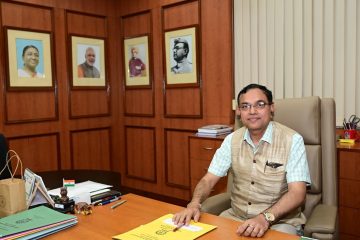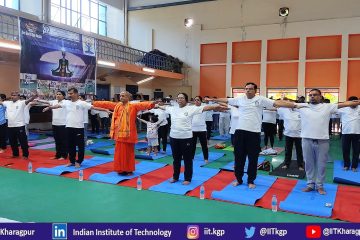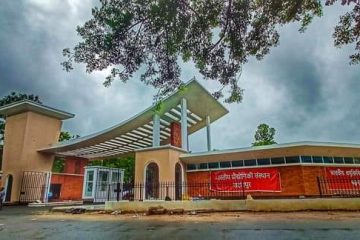Mr. Narasimhan Venkatesan Patel, Former Member of the Railway Board and an Electrical Engineering Alumnus (1951-55) of IIT Kharagpur, shares some interesting anecdotes about the faculty and how IIT Kharagpur took special tutorials of students who appeared in Class 12 exams from different boards or syllabi. The Indian Institute of Technology, Kharagpur was established in 1951 and is the oldest among all the IITs in the country. As the institute was set up in the Hijli detention camp of West Bengal, it has a link with the freedom fighters of India.
“We mostly had classes in the old Hijli Central Jail building during the first two years. A big hangar inside the compound served as the workshop. Our staff, some of whom had served in the prison administration as Jailers, mentioned that our classrooms were the rooms where prisoners who were great freedom fighters were locked up, and some were tortured and later died,” remarked the Alum.
To bolster the country’s growth and make it self-reliant, the government started establishing IITs, IIMs and AIIMS. Like other IITs, the classes of the first batch commenced on a half-constructed campus.
“Since our hostel, Patel Hall, was half ready when the first year started, we had to share rooms. Interestingly, as there were differences in syllabus levels in different universities at intermediate science where students took admission, tutorials of Math and English were organised after dinner in the hostel for the first two terms of the first year,” Patel said.
“The initial struggles and our saviour”
IIT Kharagpur campus was spread over 2100 acres in the vast tree-laden campus. Along with a tough syllabus, the initial batches had to struggle with wildlife. “There were snakes around the hostel under construction and our beloved director Dr. J C Ghosh, also a famed Indian scientist, ordered the cutting of drains around and spraying of carbolic acid. The humane and kind approach of Dr. J C Ghosh made us withstand many hardships. In the third year, we moved to the classes in the new building,” he said.
Dr. J C Ghosh left IIT in the third year to join as the Vice Chancellor of Calcutta University. A student delegation from IIT met Dr. B. C. Roy the then Chief Minister of West Bengal to plead with him the need for continuing Dr. J C Ghosh, revered as a father figure by the students. Dr. B C Roy is stated to have quipped, “We will send another father figure to you.”
Dr. B R Sengupta, Principal of Shibpur Engineering College, was appointed as the next director for IIT Kharagpur. As per Patel, Dr. Sen Gupta was a strict disciplinarian and a stickler for targets.
Despite being the first batch, the students, were fortunate to have the best faculty possible. “Dr. Krause Mechanical Engineering, Prof Malonowsky, Production Technology (UNESCO support) on the mechanical side and Prof. Keshav Murthy, Prof Srinivasan, Dr. Menon gave us deep insights into Electrical Engineering. They took us to much higher heights in the subjects that I could see the difference in when I joined DVC as an assistant engineer in the Maithon Hydel Project after college in 1955 and Indian Railways in early 1957,” Patel informed.
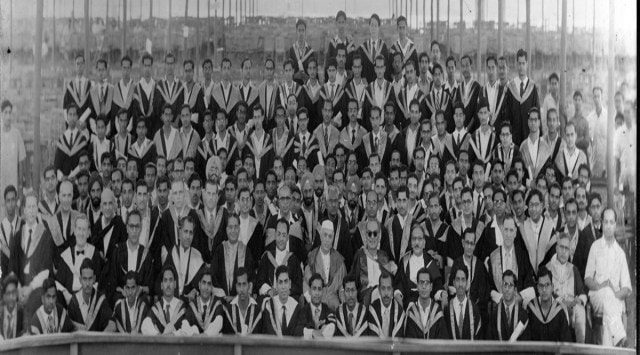 First convocation at IIT-Kharagpur. The first batch is sitting with the then PM Nehru.
First convocation at IIT-Kharagpur. The first batch is sitting with the then PM Nehru.
The Indian Institute of Technology, Kharagpur (IIT Kharagpur) was established in 1951 and is the oldest among all the IITs in the country. As the institute was set up in the Hijli detention camp of West Bengal, it has a link with the freedom fighters of India.
An electrical engineering (1951-55) alumnus, Narasimhan Venkatesan Patel (former member of the Railway Board) shares some interesting anecdotes about the faculty and how IIT-Kharagpur took special tutorials of students who appeared in Class 12 exams from different boards or syllabi.
“We mostly had classes in the old Hijlee Central Jail building in the first two years. A big hangar inside the compound served as the workshop. Our staff, some of whom had served in the prison administration as jailors, mentioned that our classrooms were the rooms where prisoners (many great freedom fighters) were locked up, and some were tortured and later died,” he told.
To bolster the country’s growth and make it self-reliant, the government started establishing IITs, IIMs and AIIMS. Like other IITs, the classes of the first batch commenced on a half-constructed campus.
“Since our hostel, Patel Hall, was half ready when the first year started, we had to share rooms. Interestingly, as there were differences in syllabus levels in different universities at intermediate science where students took admission, tutorials of Math and English were organised after dinner in the hostel for the first two terms of the first year,” Patel said.
IIT Kharagpur campus was spread over 2100 acres in the vast tree-laden campus. Along with a tough syllabus, the initial batches had to struggle with wildlife. “There were snakes around the hostel under construction and our beloved director Dr JC Ghosh, also a famed Indian scientist, ordered the cutting of drains around and spraying of carbolic acid. The humane and kind approach of Dr JC Ghosh made us withstand many hardships. In the third year, we moved to the classes in the new building,” he said.
DR JC Ghosh left IIT in the third year to join as the Vice Chancellor of Calcutta University. A student delegation from IIT met Dr BC Roy the then chief minister of West Bengal to plead with him the need for continuing Dr JC Ghosh, revered as a father figure by the students. DR BC Roy is stated to have quipped: “We will send another father figure to you.”
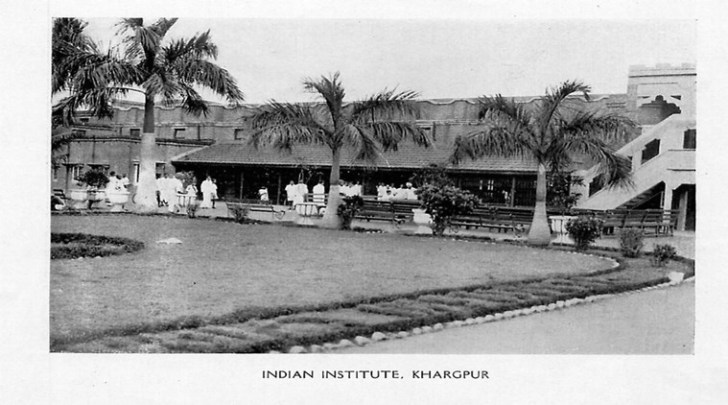 An old photo of IIT-Kharagpur
An old photo of IIT-Kharagpur
DR BR Sengupta, principal of Shibpur Engineering College was appointed as the next director for IIT Kharagpur. As per Patel, Dr Sen Gupta was a strict disciplinarian and a stickler for targets.
Despite being the first batch, the students, as per Patel, were fortunate to have the best faculty possible. “Dr Krause Mech Engg, Prof Malonowsky, Production Technology (UNESCO support) on the mechanical side and Prof Keshav Murthy, Prof Srinivasan, Dr Menon gave us deep insights into electrical engineering. They took us to much higher heights in the subjects that I could see the difference in when I joined DVC as an assistant engineer in the Maithon Hydel Project after college in 1955 and Indian Railways in early 1957,” Patel informed.
‘IITs should consider dual degree programmes’
These days, IITs are coming up with courses to skill up their students. In IIT Kharagpur, however, this has been introduced in the initial years. “One noteworthy feature of the course was the attempt to include Humanities in the course and we had the benefit of Business Management courses in two terms by Prof Nanjundiah. If IIT had allowed more courses in business administration, it would have sent the right mix of engineer managers to the industry,” Patel added.
On the issue of regular engineers drifting from core subjects to computer sciences, he said the problem is similar to losing engineering graduates seeking IIM post graduate pursuit “sometimes ending up selling cigarettes and soaps with lucrative emoluments.”
“One way would be to send out core engineers with a Diploma in Computer Sciences as well, IITs may consider shifting to dual degree programmes. AIIMS Delhi has already set up a strong IT department recognising the importance of IT in genetics health care,” he said.

An Indian Express Exclusive Story
https://indianexpress.com/article/education/iit-kharagpurs-first-batch-our-classes-were-held-in-where-freedom-fighters-were-locked-up-jeemain-2024-advanced-8969298/
Edited By : Poulami Mondal, Digital & Creative Media Executive (Creative Writer)Email: poulami.mondal@iitkgp.ac.in, media@iitkgp.ac.in, Ph. No.: +91-3222-282007
Follow us on: Facebook – IIT Kharagpur; Twitter – @IITKgp; Instagram – @iit.kgp; LinkedIn – Indian Institute of Technology
For news visit: https://kgpchronicle.iitkgp.ac.in/

